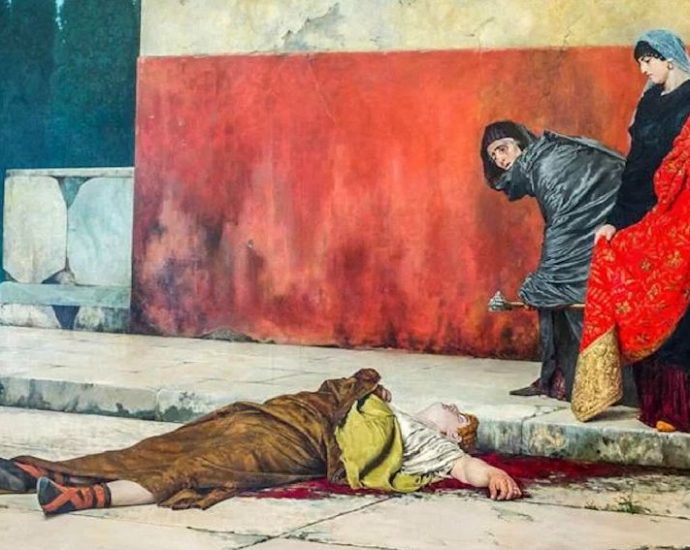The last years of Nero’s reign were characterized by a climate of fear and terror. The city and Senate were overwhelmed by the emperor’s power and suffered dearly from his paranoia. In April 68, the senator Caius Julius Vindex, governor of Gallia Lugdunensis and an Aquitanian romanised prince, decided on a rebellion, with the purpose of substituting Servius Sulpicius Galba, governor of Hispania Tarraconensis for Nero. Galba accepted the proposal and immediately marched on Rome.
The revolt in Gaul proved to be a disaster. The legions stationed in the German border marched to meet Vindex and confront him as a traitor. Led by Lucius Verginius Rufus, the Rhine army defeated Vindex in battle and killed him, subsequently hoping for a reward from the emperor. In June however, the Senate took the initiative to rid itself of Nero, declaring him persona non grata. Galba was recognized as emperor and welcomed into the city.
Galba to Otho
This turn of events gave the German legions not the reward for loyalty they had expected, but rather accusations of having obstructed Galba’s path to the throne. Their commander, Rufus, was immediately replaced by the new emperor. Aulus Vitellius was appointed governor of the province of Germania Inferior. The loss of political confidence in Germania’s loyalty resulted also in the dismissal of the Imperial Batavian Bodyguards. Whilst the rest of the empire celebrated the death of Nero, in the Rhine rebellion was on the loose.
Galba did not remain popular for long. On his march to Rome, he either destroyed or took enormous fines from towns that did not accept him immediately. In Rome, Galba cancelled all the reforms of Nero, including benefits for many important persons. Like his predecessor, Galba held an irrational fear for conspirators and executed many senators and knights without trial. The army was not happy either. After his safe arrival to Rome, Galba refused to pay the prizes he promised to soldier supporters. Moreover, in the start of the civil year of 69 AD in January 1, the legions of Germania Inferior refused to swear allegiance and obedience to the new emperor. On the following day, the legions acclaimed Vitellius, their governor, as emperor.
Hearing the news of the loss of the Rhine legions, Galba panicked. He adopted a man picked by chance in the morning audiences. By doing this, he offended many people and above all Marcus Salvius Otho, an influential and ambitious man who desired the honour for himself. Otho bribed the Praetorian Guard, already most unhappy with the emperor, to his side. When Galba heard about the coup d’etat he went to the streets in an attempt to normalize the situation. It proved a mistake, because he could get no one to his side. Shortly afterwards, the Praetorian Guard killed him in the Forum.
Otho was recognised as emperor by the Senate that same day. The new emperor was saluted with relief. Although ambitious and greedy, Otho did not have a record for tyranny or cruelty and was expected to be a fair emperor. Trouble, however, in the form of Vitellius was marching down on Italy from Germany.
Vitellius had behind him the finest elite legions of the empire, composed of veterans of the Germanic wars, such as the I Germanica or the XXI Rapax. These would prove to be his best arguments to gain power. Otho was not keen to begin another civil war and sent emissaries to proposed a peace and inviting Vitellius to be his son-in-law.
It was too late to reason; Vitellius’ generals had half of his army heading to Italy. After a series of minor victories, Otho was defeated in the Battle of Betriacum. Rather than flee and attempt a counter-attack, Otho decided to put an end to the anarchy and commit suicide. He had been emperor for a little more than three months.
On the news of Otho’s suicide, Vitellius was recognised as emperor by the Senate. Granted this recognition, Vitellius set out for Rome. The start of his reign was not auspicious however. The city was left very skeptical when Vitellius chose the anniversary of the Battle of Allia (in 394 BC), a day of bad auspices to the superstitious Roman mind, to accede to the office of Pontifex Maximus.








